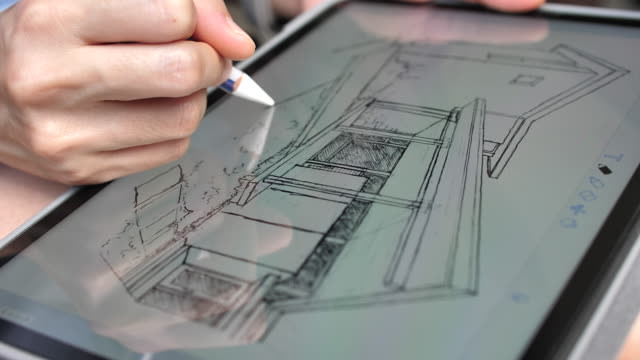
Are you an architect that works with AutoCAD you need more control over your free-hand drawings?
Are Graphic Tablets useful for Architects? Does it handle all types of tasks?
Contemplating getting a mobile tablet computer for as on on the go drawing but can't decide which fits your workflow, budget or specifications?
Architecture is one of the fields of activity where computers have given professionals a lot more precision, the ability to work faster and more efficiently.
Computers are a necessity in today's world. It encourage creativity through the use of apps that help in creating digital art like drawing and painting.
If you have a smoothly working laptop with architecture softwares such as Revit, 3dsmax, SketchUP, Archicad, Autocad, Rhino, etc. you may want a drawing tablet that comes with a digital pen to work with it.
As architects, we tend to draw a lot, sketch everything we see in our way, even if it is just drawing trees, people, or just doodling down what seems to be buildings.
But, what if we want to do all of this and put it digitally right away?
There are two ways of doing this, scanning all of your sketches and importing these into photoshop or illustrator software, or doing these sketches directly on a graphic tablet.
The AutoCAD ( also support some other architecture programs, You need to check first ) software fully supports drawing tablet, which enables you to quickly sketch an idea or easily modify parts of your drawing.
what is drawing tablet? and the types?
A graphics tablet is an optional electronic input device for computers, generally used by architects, engineers, artists, and others who want to correctly edit pictures.
Graphics tablets come with a stylus or pen with removable tips and have pressure sensitivity, allowing artists to have more brush stroke variation as determined by how hard they push the pen to the screen.
The Drawing tablets for Architects and Designers work best for those who do a lot of sketching, concept design, rendering or, illustration.
Also, for those used to sketching with a pencil and paper, you will be able to easily pick up the basics of using drawing tablets while advanced users are introduced to a world of deep functionality.
These drawing tablets come in three forms:
Pen Tablets

It includes two main components, i.e., a flat, rectangular pad on which to pull and a stylus applied to locate shapes on the pad.
Simple drawing pads that connect to a computer and are typically less expensive than other options. you will need to see the pc's screen to visualise how your drawing comes out.
They're perfect for beginners or established artists looking for an inexpensive option. Nowadays they tend to be wireless with an internal battery.
Pen displays

As traditional artists usually love the feel of drawing on paper, so the designers have come up with a way to recreate that feeling.
Feature a screen that you draw on but must be connected to a computer to supplement the necessary amount of power. They cost a bit more, but being able to draw directly on your art instead of staring at a computer monitor with your hand on a separate pen pad is really convenient.
A digital drawing tablet with screen allows you to blend your creativity with technology. With a screen that feels like paper-like-texture, you can have a more natural experience drawing.
if you have a slightly higher budget, you should consider choosing display tablets.
Pen computers / All-in-one tablets
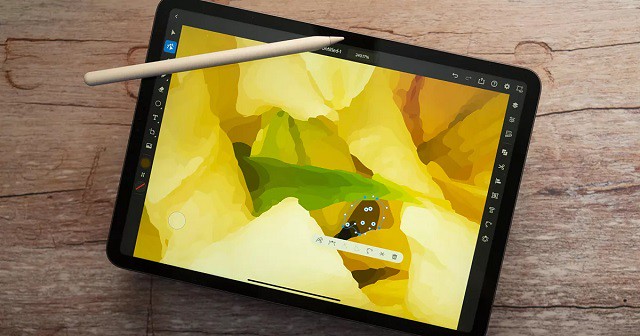
Standalone machines that feature HD displays and don't need to be connected to other devices to function. This is often what you'll see high-end professionals working on.
These are the most expensive tablets. One of the biggest advantages of these tablets is that you don't have to attach them to the computer to see your drawings. Furthermore, they are lightweight, making them one of the most portable devices.
What you'll want to keep in mind are the following things:Your screen size requirement, battery life, use case, and what operating system you prefer for use.
Since drawing tablets interact with computers, it gives you access to more intensive architecture software than a mobile app can provide.
Drawing tablets can also have massive displays making it easier to work on the finer details of your work.
However, the trade-off here is that drawing tablets aren't nearly as portable since they either need to be connected to a computer or can be too bulky for easy mobile use.
What Are the Uses of Graphics Tablets in industrial design?
It is almost difficult to describe the use of graphic tablets in a single sentence since they are used instead of a mouse in various ways. They are a necessary tool adopted across a pile of multiple industries and artistic niches.
Graphic tablets use the human hand's fluid motion and physical positioning to its most magnificent power. Utilizing a graphic tablet is as convenient and straightforward as using a pencil, pen, or airbrush.
In industrial design, architects & engineers spend hours in the head of computer screens to build that ideal design. This may increase the need for persuasive drawing devices with unique features to induce their visions to life. The hardware and congenial software are steadily advancing. With the height of the list of new products, it is possible to discard your traditional screen and mouse and move entirely to a graphic tablet.
The one who does many illustrations, concept design, sketching, or rendering work might find a graphic tablet most useful.
They use graphic tablets because the use of a digital pen feels more natural to hold and work. This empowers them to create and design more smoothly and speedily.
Benefits Of Using Graphic Tablets For drawing architecture
One of the great things about having a drawing tablet is that being a architects, you can increase your productivity a lot.
By getting a drawing tablet, you're going to be able to do just what you're doing with pen on paper right on your computer screen.
Architects and designers can rely on it for their ideations and sketches with the help of the pen that comes with it.
The stylus makes the creation more effortless and convenient as everyone is used to keeping a pen or pencil in his or her hand.
Through a stylus, the tablet is used to create complicated shapes and allows a more natural drawing motion than it is possible with a computer mouse.
You're going to be able to draw nice straight lines exactly as you want and waste less time redoing them to look right.
you can zoom in and pinpoint the stylus just where you like it. Your creations will now look 100% like you want them to and you have complete power over the stylus and drawing tablet.
The drawing tablets use pressure detection technology ( This is a unique feature of a drawing tablet and the app used for the purpose ) to trace current images which can storing in a digital format for uses like archiving or retouching.
Writing or drawing extensively with mouse can lead to repetitive stress injuries and even carpal tunnel syndrome. Many Architects and designers suffer from these injuries. Choosing graphic tablets instead of mouse helps in avoiding all these injuries.
The tablet have Functional keys around the active area can be programmed to create shortcuts. This saves time by offering quicker access to the most-used command functions.
If you're excited about the value of getting a drawing tablet, you're going to enjoy working with one!
The 6 best drawing tablet for architects
Plan on getting a new tablet for AutoCAD, SketchUP, Archicad, Revit, 3ds max, photoshop, etc?
Tablets are essential devices when it comes to architecture and construction because without them, making changes to drawings can be a time-consuming task. And so, they make things easier for you.
Wacom drawing tablet models are especially ahead in the industry. But from my experiences, it's true that XP-Pen's products have been getting better over the years to the point where their products could directly compete with Wacom's products, and their price, compared to Wacom's, is relatively cheaper, which means you could possibly get more value with the same budget.
If you are an artist and looking for a compact and powerful drawing device, you must have come across Apple iPad Pro and the Microsoft Surface Pro.
In this article, we list the 6 best tablets for architects, architecture students and construction drawings.
1. Microsoft Surface Pro 7
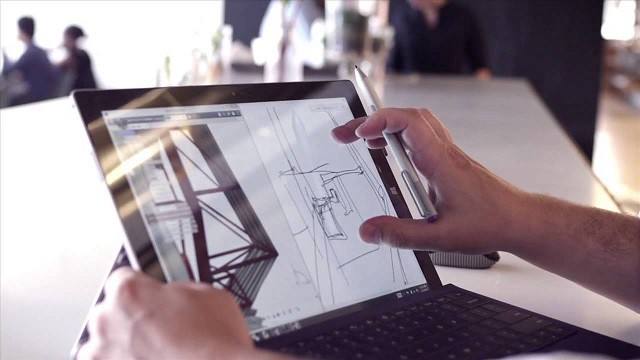
Microsoft Surface Pro 7 is a tablet and a laptop at the same time. In other words, you get the best of both worlds.
Because the ability to detach the display from the keyboard makes it a tablet, and putting it back transforms it into a laptop.
So unless you will be doing some serious rendering, then the Microsoft Surface Pro 7 is a solid option for architecture.
The performance varies because of the different configurations. The most powerful has an Intel Core i7, 16GB RAM and 1TB SSD. Whiles the base model has an Intel Core i5, 8GB RAM, and 128GB SSD.
The display is bright and beautiful making it easy to be used outdoors. And the build quality is better than the previous version – Surface Pro 6. But, the weight and thinness are still the same.
The stylus of the Microsoft Surface Pro 7 is one of the things that makes it great for drawing and making changes to the plan. However, it is sold separately and that includes the keyboard.
Its Color Gamut is 97 percent of sRGB ( 72% NTSC / 79% Adobe RGB ), very close to the Standard Gamut. Battery life is decent about 8 hours on average. Good enough for a day's work.
Overall, the Microsoft Surface Pro 7 is one of the best tablets for architects and construction drawings. It's lightweight and has enough performance to handle architecture software. Highly-recommended.
2. iPad Pro

Brilliant 12.9-inch Liquid Retina XDR display with ProMotion, True Tone, and P3 wide color. which is bright, sharp and has great viewing angles. 5G for superfast downloads and high-quality streaming.
New features include a near edge-to-edge display, a lot more storage space, a 12 megapixels camera for insanely sharp pictures and a 35% faster processor. Apple M1 chip for next-level performance. That means this iPad outperforms many laptops speed-wise.
The iPad Pro 11-inch is compatible with the new second generation Apple Pencil. If you use a stylus a lot – to draw and do more detailed work – the new Apple Pencil has some updates that might interest you. It's technically more advanced meaning it's even more pressure sensitive and will react in absolute unison with your hands movements.
You can also charge it with a magnetic connection, which means it automatically recharges while you're not using it. No need to plug it into your iPad to charge it, which gives it a clear edge over the first generation of Apple Pencils.
Battery life is superb easily able to last over 10-11 hours. However, the stylus pen, keyboard and trackpad are not included in the package. So, you have to make a separate purchase.
A lightweight device that you can take along to construction sites and architectural projects. which lets you easily bring your technical drawings and view their details with the highest accuracy wherever you need to. The Apple iPad although pricey offers much better value and performance than most drawing tablets.
3. XP-Pen Star G640S
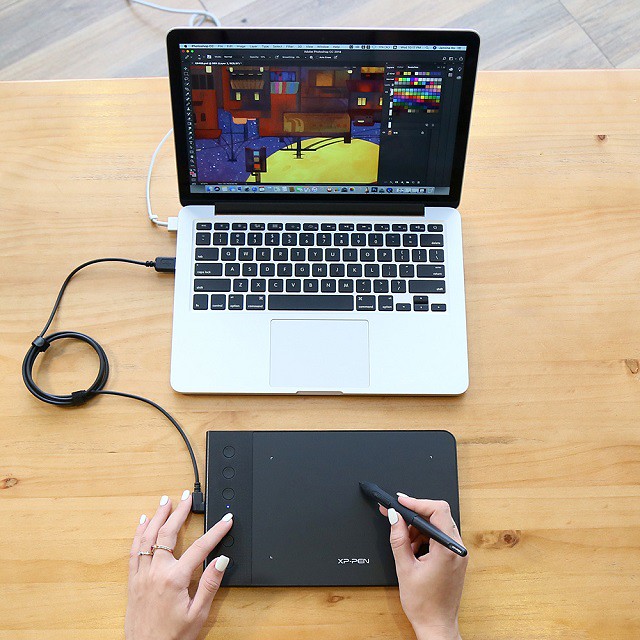
The XP-Pen Star G640S is one of the cheapest option, and with a 6.5×4 inches working area, it's also one of the smallest and lightest. That means it's easy to stick in a bag and take on the go.
It has 8,192 levels of pressure sensitivity, which matches that of much more expensive models, and promises to work with Windows, Android , Chromebook, Linux , Mac Operating system and a wide variety of graphics software.
It comes equipped with 6 customizable physical keys and 20 replacement pen nibs. The stylus does not need charging which ensures no disruptions in the middle of work.
XP-Pen Star G640S is ideal for drawing, editing, sketching, animation, and digital signatures.
Because of its size, it's definitely a starter tablet, but if you're just looking for something to begin, then this might be a good product to start.
The Star G640 offers the best drawing pad option for any architects and engineers looking for a portable, decent-priced tablet.
4. XP-Pen Deco 03

Experience a more natural way of working on your computer with a 2.4 GHz wireless connection.
The drawing tablet has a larger active drawing area than Star G640S in this list at 10 X 5.62 inches and 8mm thick.
The tablet comes with six built-in expresskeys and a red scroll wheel to help improve your workflow and speed.
The battery-free stylus included comes with two shortcut buttons and 8192 levels of pressure sensitivity, that provides natural looking, accurate and efficient strokes.
The drawing area has a glossier finish than other tablets available, but there is still a slight paper-like surface that imitates the feeling of drawing with a pen and paper.
For those on a tight budget who cant yet afford a Wacom Intuos tablet, the XP-Pen Deco 03's performance and features are way beyond what you can expect to pay for it. With plenty of shortcut keys, precise levels of pen pressure and a textured drawing surface.
Its sleek design plus its A4 size large working area is the perfect choice for architects, engineers, and students using CAD, 3D sculpting programs, and other software.
5. XP-Pen Artist 13.3 Pro
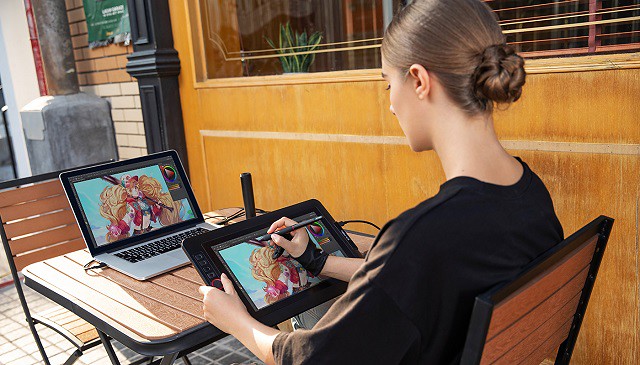
The 13.3-inch screen that comes with an anti-glare film. the XP-Pen Artist 13.3 Pro's Fully laminated Screen seamlessly combines the glass and LCD which reduces the parallax.
With its rich 16.7-million color display (6-bit) , 1920x1080 FHD resolution and 88% NTSC ( 120% sRGB / 91% Adobe RGB ) gamut, the Artist 13.3 Pro certainly runs the gamut of quality graphics and colors.
The pen is sensitive and can detect pressure on the screen, allowing you to have great control, which is highly important for any professional architect.
It also supports a 60-degree tilt brush effect, letting you apply just the right strokes to your CAD drawings.
Designed for either left-handed or right-handed use, the Artist 13.3 Pro also has 8 customizable buttons and 1 red roller wheel to make drawing easier than ever.
Whether you're a beginner, a casual artist, or a professional, the XP-Pen Artist 13.3 Pro is the best drawing tablet option for an easy yet professional user experience.
6. XP-Pen Artist 22 2nd Generation

Its 21.5 inches large display helps you to access any software's dashboard and artboard more perfectly. A larger screen allows you to more easily draw fine details .
The drawing tablet provides precise accuracy with colors and more vibrancy compared to older models ( Artist 22E Pro and Artist 22 Pro). The display offer realistic color accuracy up to 90% Adobe RGB ( 86% NTSC / 122% sRGB ). which means you can accurately reproduce even the most subtle shades.
Its PA6 battery-free Pen has 8192 pressure levels and 60 degrees of tilt function that creates smooth and natural lines.
The graphics display tablet supports USB-C to USB-C connectivity. This makes it easy to connect it with other devices that support USB-C input.
Artist 22 2nd Generation comes with a stand that can be adjusted as per the working position.
Users particularly love how crisp and vibrant this drawing tablet's display is. Simplify your workflow by getting this well-built drawing tablet for architects and engineers.
7. XP-Pen Artist 24

The larger model 24” comes with a 2K ( 2560 x 1440 ) QHD resolution and can display 94% of the Adobe RGB ( 90% NTSC / 127% sRGB ) color space.
The PA6 digital pen has been engineered with Battery-Free Electromagnetic Resonance (EMR) technology.
Stylus does not need charging and ensures smooth lines with 8192 pen pressure levels, 60 degrees tilt recognition and a 233PPS report rate.
Its adjustable stand that comes with the XP-Pen Artist 24 device has an ergonomic design to provide comfort while working.
This is the perfect high end tablet for cad drawings and fast SketchUp. you can create plans and technical drawings with the utmost precision and efficiency.
Conclusion
Choosing the right graphics tablet for your projects is the key to get good quality digital artworks.
The drawing experience (pen to screen) is much more natural.But if you are just starting out, a screenless tablet will work fine for what you want to do.
I couldn't exactly say which model is the best for you as architects' needs vary heavily from a person to another. For me, I put the most weight on the color accuracy and the responding speed of the display because the nature of my work requires high color accuracy (lots of printing and digital displaying). Others may put weight on the pen's performance due to their drawing styles, which require highly responsive actions.
Digital drawing tablets are a godsend for all the architects out there as it has eliminated all the hassle of endless large canvases or pages. They have also enhanced the accuracy of their designs, along with boosting their efficiency and productivity; even on the go.
Since these devices are solely designed for the purpose of drawing, you get a true and enhanced convenience to bring all your visions and creativity to life.
If you're an architect or a student of architecture; or even if it's to recommend the best tablet for architects to your friend or relative, this write-up is just for you.
Let me know in the comments below what are your thoughts on a Graphic Tablet and contribute to this community with your experience using one.
Source Link: https://www.xp-pen.com/forum-2817.html

ความคิดเห็น